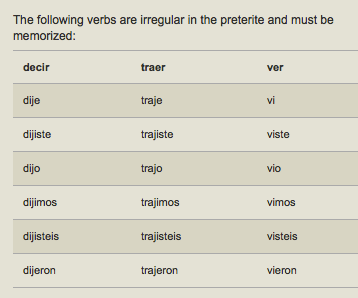You MUST review the Preterite. Check the G&V page 35 on this chapter (click link), and the image below:
Besides the verbs in the box above, conjugate the following (in the Preterite): entrevistar, investigar, participar, salvar, enterarse, estar, leer, ser, ver, contribuir, decidir, divertirse, escribir, sufrir, and others. Pay attention to the verbs tocar, llegar, comenzar (review the bottom of the box above). LIBRO pages 104 - 108 are important!
Go to the Aventura G&V pages and review and work on the following Chapter 3 pages: 35, 36, 37, 38, 39, 42, 43 and 44. It's essential that you know the Preterite and the Imperfect of Regular and Irregular Verbs. Also check: http://www.studyspanish.com/lessons/pret5.htm (StudySpanish.com). Review the following verbs in the Imperfect: estar, estudiar, jugar, practicar, haber, hacer, leer, ser, tener, escribir, ir, pedir, vivir, divertirse.
 |
| Preterite of Verbos Decir, Traer & Ver |
You must understand when to use the Preterite and when to use the Imperfect. Check G&V page 46 and page 47. It is common to use both the Imperfect and the Preterite in a sentence. Several verbs change in meaning depending whether they are used in the Preterite or the Imperfect, check G&V page 48 to check this. Also check: StudySpanish.com/PreteritevsImperfect. LIBRO pages 115-117, pages 124 and 125, and page 127.
The verbo GUSTAR IS DIFFERENT (you use the Indirect Object Pronouns - ME TE LE NOS OS LES). Remember that in the Present Tense you only use GUSTA with singular nouns and the infinitive, and GUSTAN with plural nouns. Examples: A mí me gusta la pizza, a ellos les gusta bailar, a nosotros nos gustan los tacos. In the Preterite Tense (only GUSTÓ or GUSTARON): A mí me gustó la pizza, a ellos les gustó bailar, a nosotros nos gustaron los tacos. In the Imperfect Tense (only GUSTABA or GUSTABAN): A mí me gustaba la pizza, a ellos les gustaba bailar, a nosotros nos gustaban los tacos. Come up with more examples! It is GOOD PRACTICE!
G&V page 41 reviews the time expressions with "hace." When do you use "hace -time- que" + Present Tense or Preterite or Imperfect of Verb? Examples: Hace tiempo que no iba al cine (it's been a while -a long time- since I went to the movies); hace años que no pinto (it's been years since I painted); hace tres días que fuí a la casa de mi amiga (It's been three days since I went to my friend's house); hace una semana que no bailaba (It's been a week since I danced). LIBRO page 114.
On G&V page 50 you will learn the Pluperfect Tense (Past Perfect) - el Pretérito Pluscuamperfecto, which consists of the Imperfect Form of the Verbo Haber followed by a past participle. The past participle of estudiar is estudiado.
Practice with other verbs: cantar - cantado, bailar - bailado, estar - estado, preparar - preparado, viajar - viajado, comer - comido, ir - ido, leer- leído, tener - tenido, ser - sido. Notice that -AR verbs end in "ado," -ER and -IR verbs in "ido." Complete G&V page 51 to practice. Exceptions: hacer - hecho, decir - dicho. ver - visto. Also check: http://www.studyspanish.com/verbs/lessons/pastperfect.htm. Also check your LIBRO page 134 for verbs with regular and irregular participles. Exercise No. 23 on page 135 is important too!
For verb conjugations (different tenses) check: http://www.spanishdict.com/conjugate/hacer.
The last thing on this chapter is "Relative Pronouns." Check LIBRO pages 136 and 137. Also check G&V page 52 and page 53.
¡Buena suerte!

